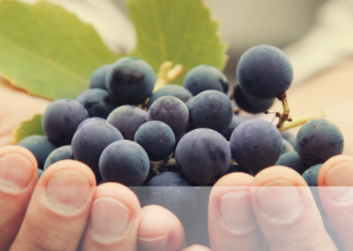Posted: Jun 28, 2017

A study analyzing the combined effects of resveratrol and grapeseed extract shows encouraging signs for health-conscious wine drinkers
Wine and cancer have a complex relationship—moderate consumption has been linked to some forms of cancer, most notably breast cancer, but other studies have shown it may reduce the risk of other forms. New findings suggest another health benefit to drinking wine: preventing and battling colon cancer.
Colon cancer is the third-most common cancer in the United States, and the second-most common cause of cancer-related deaths. The new study, published in BMC Complementary and Alternative Medicine by researchers at Pennsylvania State University, tested the effects of resveratrol and grapeseed extract on mice with cancer and on human stem cells in a petri dish.
Studies that focus on resveratrol are common these days, but the supplemental proanthocyanidins of the grapeseeds are new ground. "Individually they are not really effective, but the combination is very effective," said Dr. Jairam Vanamala, associate professor in the Department of Food Science at PSU and lead author of the study.
Another crucial element of the study was to compare these grape compounds with Sulindac, an anti-inflammatory drug that is used in colon cancer chemotherapy in some countries in Europe, according to Dr. Vanamala, but not in the U.S. The drug is very effective, but can cause intestinal bleeding. "That's why we wanted to see whether grape compounds can suppress the tumors but not have the negative effects of Sulindac," he explained.
The researchers injected 52 mice with a carcinogenesis and divided them into four groups that received different diets. There was one control group, one group given Sulindac, and two groups with varying doses of resveratrol and grapeseed extract. Human colon cancer stem cells were also subjected to both the Sulindac, and the resveratrol and grapeseed formula.
Mice that ingested the grape compounds suppressed the tumors by over 50 percent. Sulindac showed similar results, however, it also gave the rodents ulcers. In the case of the petri dish, the colon cancer cells were very limited in their ability to grow in the presence of the grape compounds.
As to why these plant-based compounds might have an impact, Dr. Vanamala has seen evidence that cultures with a plant-based diet focused around fruits and vegetables show lower rates of colon cancer. He believes the "food approach," as he calls it, could be the safest and most affordable prevention methodology, provided it is evidence-based. While more research is needed, the results of this study suggest high chemopreventive and chemotherapeutic potential for resveratrol bolstered by grapeseed extract.
By Emma Balter
June 27, 2017
Source: Winespectator.com
Go-Wine's mission is to organize food and beverage information and make it universally accessible and beneficial. These are the benefits of sharing your article in Go-Wine.com


The Wine Thief Bistro & Specialty Wines is a locally owned small business in downtown Frankfort, IL offering world class wines in a relaxed, casual gathering spot for friends and family. Offering world class virtual tastings and touchless carryout.
https://www.twtwineclub.com/aboutus
Go-Wine 25 Great Wineries in US selection prioritizes quality, value and availability.
www.go-wine.com/great-wineries-in-america
Tasting wine is a nice experience, but visiting the places in which wine is made is a magic moment. Available in New York City for touchless pickup.